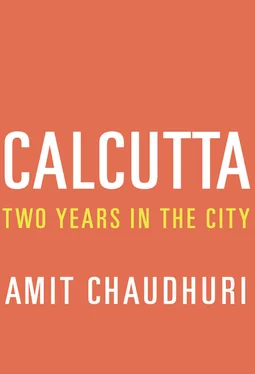Supply was ensured too. Cyclone Aila, or Hurricane Aila as it’s often known locally, had devastated crops and cultivation in North and South 24 Parganas beyond the city in 2009, the year of Mr. Das’s centre’s inception, and its after-effects still sent a steady trickle of women towards him, and from him eventually to our part of the city. The women from these centres — not Kamala, though, for she’s very much a Calcutta person — have the sullen, shell-shocked air of refugees, of people who don’t know where they are and what they’re doing there. They are unimpressed by upper-middle-class luxury; they’re swiftly bored; they’ve worked in one kind of world all their lives, and are now being asked to comprehend different appetites and demands which make them look despondent and probably feel homesick. “Women also have to work because their men drink,” said Mr. Das. “They drink and die.” We discussed the adulterated liquor — country liquor or “hooch” as it’s romantically called by newspapers — that claimed, in mid-December, the lives of one hundred and seventy men in a town near the Bihar border. What had struck me was not just the scale of the tragedy, but how little sympathy was expressed in the media for these fatally misguided drinkers.
When a domestic with whom you’ve had a long-term, rocky relationship — one that goes on and off, on and off — begins to feel restless, there may well be signs, so indecipherable as to be non-existent, that she’s about to go again. I’m thinking of Lakkhi’s last stint with us — by “last” I don’t mean “final,” but “most recent.” There’s never anything but a cursory finality in one’s interaction with a domestic; renewal is usually in the offing.
After Lakkhi’s husband’s painful demise, she returned distractedly to the fold. In two months, her timings were awry again; midday when it should have been ten o’clock; then later than midday. And she deftly smuggled a little companion into the room adjoining the kitchen. At first, only his voice could be heard — high-pitched, pointed, intermittent, making no kind of sense; then I caught glimpses of his wispy figure.
I realised I’d seen him before. He’d been smaller then — Lakkhi’s grandchild, who’d come with her before on a couple of visits. He was still small for a four-year-old, and I was drawn to his high spirits. The boy, whose name was Raja, brought out the vagrant in me; I’d go off in the middle of my writing to investigate his whereabouts.
Raja was flattered by my attention and made a big show of avoiding me. We began to understand, after a week, that his appearances weren’t going to be exceptional — they’d be the norm, for he was arriving at our flat every day with his careless-seeming grandmother.
He was very dark: what Bengalis call kuch kuche kaalo or “extremely black”—his late grandfather’s complexion, apparently. He had an undernourished, springy agility and bright eyes. Lakkhi had no choice but to bring him along for now. Her younger daughter, Raja’s mother, was mentally challenged — that much we knew. She’d been married off six or seven years ago with the usual transactional resolve that Indians have — that life, sociability, and procreation must continue regardless, that marriage is a simple counter to the untoward. Husband and wife produced this child: further evidence of marriage’s primordial normalcy. Then, as husbands will, the man vanished. The younger daughter returned to Lakkhi, abstracted and strangely discontented. She had little awareness of or interest in Raja. He, in the meanwhile, had begun to go out on excursions, and Lakkhi found the mother in one place and the boy in another. She fretted; but she had the cooking to do. So she began to bring him to our apartment and deposit him in the kitchen.
He was a clever boy and, once he got over his shyness, full of a specious bravado. It was extraordinary to hear him in the kitchen — disrupting a place of work.
“Are you going to put him in a school?” I challenged Lakkhi. It may have slipped her mind.
“Yes, I’m looking for a place for him, somewhere I can keep him while I’m here,” she said in her characteristic way, suggestive that every decision she has to take, including removing food from the fridge, is onerous.
“A place you can pick him up from on the way back, or a place he can stay in?”
“It would be best to pick him up,” she said, again with that tortured look.
“Then it should be somewhere around here,” I said, gesturing vaguely at the haute bhadralok vicinity of Ballygunge. “I have a school in mind.”
I had a stealthy feeling my efforts would come to nothing — I’ve noticed, from a review of past actions, that my attempts to help people are usually oddly thwarted, by a combination of circumstances and probably by an overestimation by me of the wider world’s receptivity to my ideas. This prior knowledge didn’t keep me from calling Tim Grandage, who lives in my building. I know Tim slightly, but I’ve been aware that his school for orphaned children — fortuitously located in the very area we live in — is regarded by all as a genuine success. What a good place it would be for Raja, for both disposing of the problem of this boy and giving him a future — and also for giving Lakkhi a relief from chores other than cooking. Tim, however, was in England; he’d be back, I was told by his flat’s caretaker, after the Pujas. Ironically, I was just barely getting used to not being in Norwich and embracing the season’s new-found calm. Otherwise, now, I’d be teaching students as it grew dark, or sipping on an americano at Starbucks.
“I’ll pursue this when my friend returns from England,” I told Lakkhi. She nodded moodily and continued to scrape the potol , or rinse the moong pulses, or cut the chhana into little squares.
Raja began to lose his shyness. At first, it was an unconscious shedding of inhibition after lunch, when there was a lull in kitchenly activities, and an abnegation of power among those who ruled over the apartment — my parents withdrawing into nap time; I into writing; my daughter not yet back from school. Normally difficult to inveigle from the kitchen, Raja emerged in the drawing room and took over the furniture. He was quickly lost in a daydream; he’d sit on the divan or on the sofa and spend his time in one or the other posture, either with a leg in the air, or half-lying against a cushion. He was a little parody of a despot.
After eight or nine days, he was wholly not in awe of me, and as interested in my whereabouts as I’d been in his — possibly more interested. His new lack of regard and presumptuous four-year-old friendliness were my doing. I had “encouraged” him. My reasons for fraternising with Raja were selfish; I found him hilarious. Besides, “all things can tempt me from this craft of verse.” In the midst of writing about the city, I was susceptible to distraction. And now, in a manner of speaking, he was all over me. He was a tough and single-minded taskmaster: just as we demanded timely meals from his grandmother, he wanted constant diversion from me. As with my mother’s and R’s view of my work, Raja wasn’t convinced that a man sitting around with a notebook and pen was seriously occupied. I was most probably doing nothing. His way of hinting to me that he was available was by coming straight to my room after Lakkhi arrived (she was now keeping pretty erratic times), smiling vaguely, and clicking on his palate with his tongue, producing a soft, insinuating sound. When I mimicked this to R, she fell about laughing; but to me it was becoming tiresome, something which I at once looked forward to and dreaded. Familiarity was also beginning to make him provocative, and test how much of the upper hand he could gain. He had to have ownership of the remote control (irrespective of whether the TV was on or not), transporting it, like a courier, from room to room; but he also claimed, in his limited, blithe pidgin, that his TV was bigger than ours. Besides, he had his eyes on the cheap English biro with which I pursue my writing, making off with it on impulse; I hadn’t sufficiently appreciated that he had his own pen, and, in our tussle to retrieve our rightful paraphernalia, I’d sometimes take his pen and upset him deeply — but briefly, as he still had no understanding of prolonged deprivation or lack. We became a kind of exasperating drama to the maids, who felt I was ineffectual and said: “You must holler at him properly.” At the peak of our interfaces, they’d pick him up, and remove him, ignoring his scandalised cries, from my room; but he was like some sort of spring, and in five minutes he’d bounce back, ebullient, making the soft clicking noise in his mouth. I began to lock my door, which I never like doing.
Читать дальше












